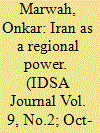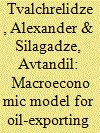| Srl | Item |
| 1 |
ID:
126827


|
|
|
|
|
| Publication |
2014.
|
| Summary/Abstract |
We analyze oil export behavior by Saudi Arabia and the Rest of OPEC since 1973. In the literature there has been a wide range of estimates of their correlation: from positive, to zero, to negative. We find that the correlation has varied over time, from moderately high (0.7) in normal periods, to negative during each of five interruptions; the average correlation has been 0.19. Saudi Arabia's oil market behavior depends upon circumstances, but its primary goal is the stability of OPEC and the world oil market. It will coordinate export reductions with the Rest of OPEC when faced with declining demand, but it will increase exports when faced with interruptions elsewhere in OPEC. Allowing for such differences provides evidence of intelligent, context-dependent consistency. But ignoring context - by wrongly assuming the same Saudi response in Normal periods and Interruptions - can lead to a conclusion of Saudi "inconsistency" because the difference in the responses has been obscured.
|
|
|
|
|
|
|
|
|
|
|
|
|
|
|
|
| 2 |
ID:
142044


|
|
|
|
|
| Summary/Abstract |
Critiques of China’s ‘oil diplomacy’ center on its alleged disregard for transparency and human rights, yet such claims ignore that the problematic relationship between resource extraction and human rights precedes Chinese market entry. This article explores whether human rights implications are more serious for states exporting oil to China compared to another major oil importer, the United States. Contrary to the conventional wisdom, we argue that oil export dependence on the USA affects human rights more negatively than dependence on China because of differences related to the timing of market entry. The United States established stable relationships with oil supplier states decades ago, creating dependencies that are sufficiently long-term for the implications of the resource curse to take hold, and taking place before human rights became part of the US foreign policy agenda. In comparison, China’s late entry into global oil markets in the early 1990s meant that market access often required the provision of generous loan packages, which may help counteract the detrimental effects of oil dependence. Our empirical analysis examines the impact of oil export dependence on China versus the USA on human rights in supplier states for the 1992–2010 period. Results show that oil producing states dependent on exports to the USA exhibit lower human rights performance than those exporting to China. We also demonstrate that lower human rights performance for US exporters stems from long-term trends rather than short-term fluctuations in oil export dependence.
|
|
|
|
|
|
|
|
|
|
|
|
|
|
|
|
| 3 |
ID:
115902


|
|
|
|
|
| Publication |
2013.
|
| Summary/Abstract |
Since the Islamic Revolution, Iran and the United States have been locked in a bitter conflict. Although it has not yet degenerated into a war, as has been the case with some international conflicts, isolation of the Islamic government has become the basic objective of US foreign policy towards Iran. US policymakers maintain that economic sanctions can force the government of Iran to change its policy on many international issues. The sanctions have had their impact, as can be seen by the gradual decline in Iran-Europe relations, and the Iranian state has lost the support of its traditional partners. In such circumstances, some Iranian policymakers have proposed that Iran should replace its European partners with Asian countries in need of energy. This explains the shift in Iranian policy towards Asian countries.
|
|
|
|
|
|
|
|
|
|
|
|
|
|
|
|
| 4 |
ID:
184677


|
|
|
| 5 |
ID:
127607


|
|
|
|
|
| Publication |
2013.
|
| Summary/Abstract |
This article explores the relationship between GDP and net oil exports in major oil-exporting countries. The extremely strong positive correlation between these parameters makes it possible to develop GDP models for these countries based on exports of crude oil; it has been demonstrated that they are described by a quadratic regression with acceptable reliability. The study results show that the oil industry is the main driver of economic development in the modern world. Even where direct oil exports make up an insignificant part of GDP in oil-exporting countries, their impact on economic development is decisive.
|
|
|
|
|
|
|
|
|
|
|
|
|
|
|
|
| 6 |
ID:
116648


|
|
|
|
|
| Publication |
2012.
|
| Summary/Abstract |
Should countries care about where they get their oil? As Middle Eastern oil exports to Asia rise while shipments to the United States and Europe fall, analysts are asking whether this trade shift will have geopolitical consequences, drawing China politically closer to the Middle East while driving the West further away. In North America, the debate over the Keystone XL pipeline, which would have transported crude from Canada to the US Gulf of Mexico, featured proponents who trumpeted the value of relying on a friendly source of oil and sceptics who insisted that the origin of US oil imports doesn't matter. Throughout the world, many still worry that dependence on the Persian Gulf leaves countries exposed to blackmail; other analysts, though, insist that markets have rendered such threats impotent.
|
|
|
|
|
|
|
|
|
|
|
|
|
|
|
|